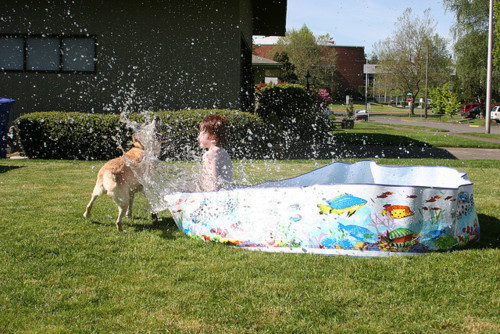REC Everything

I went on vacation with my family recently (Mexico), and shared a camera with my father. This brought back a flood of memories of a syndrome from my childhood. It's called DNVS, and it's as contagious as it is unforgiving.
Depending on when you grew up, you may or may not be familiar with "Dad's New Video (Camera) Syndrome." DNVS is incurable (except by time) and can be exhausting for all involved. Its spread to epidemic levels in the '90s was directly related to the falling prices in video recording technology, and resulted in millions of hours of historically critical footage of babies eating baby food, and your brother taking his first swim in the new avocado-colored kiddie pool.
The infected suffer from an uncontrollable urge to record every moment of passing time on video cassettes. Nothing is so ordinary as to be exempt. The act of capturing "mom doing the dishes" forever seems to lend the activity new value. It is being preserved, framed, erected, and, really, defamiliarized. Watching "mom doing the dishes" later, we may realize many things about the activity we had never considered. "I never realized week-old macaroni could be so… adhesive."
Watching these videos, we may be struck by the sense of desperation in the afflicted's movements. The camera swings wildly from one side of the yard to another, as if terrified that the camera will miss some crucial moment, some critical second of family history. When will Timmy find Johnny, ending this truly epic, table-turning saga of "hide and seek Sunday?"
What is it that's so captivating, seductive, hypnotic about the process of capturing sound and image? DNVS is not limited to video cameras. Still cameras can cause similar bouts of madness. It is also not limited to dads.
I think the impulse toward all artistic creation is hinted at in dad's preoccupation with video-capture. We want to save things, evoke things, erect things. We want to build.
Hannah Arendt separated all of human activity into three categories: labor, work, and action. Labor sustains us, work secures for us a niche in the world, but action is less directly pragmatic. For Arendt, action meant building things that would last longer than we would as builders. Beyond just needing food and water and shelter, humans were always taking "action" to tell their own stories, writing them in stone or ink. It was about struggling to interact with our world in a permanent, meaningful way before we left it: Building pyramids, taking home video, and of course, writing novels.
– Max
Photo by Flickr user Scott Huber
Chris Baty's Blog
- Chris Baty's profile
- 63 followers



